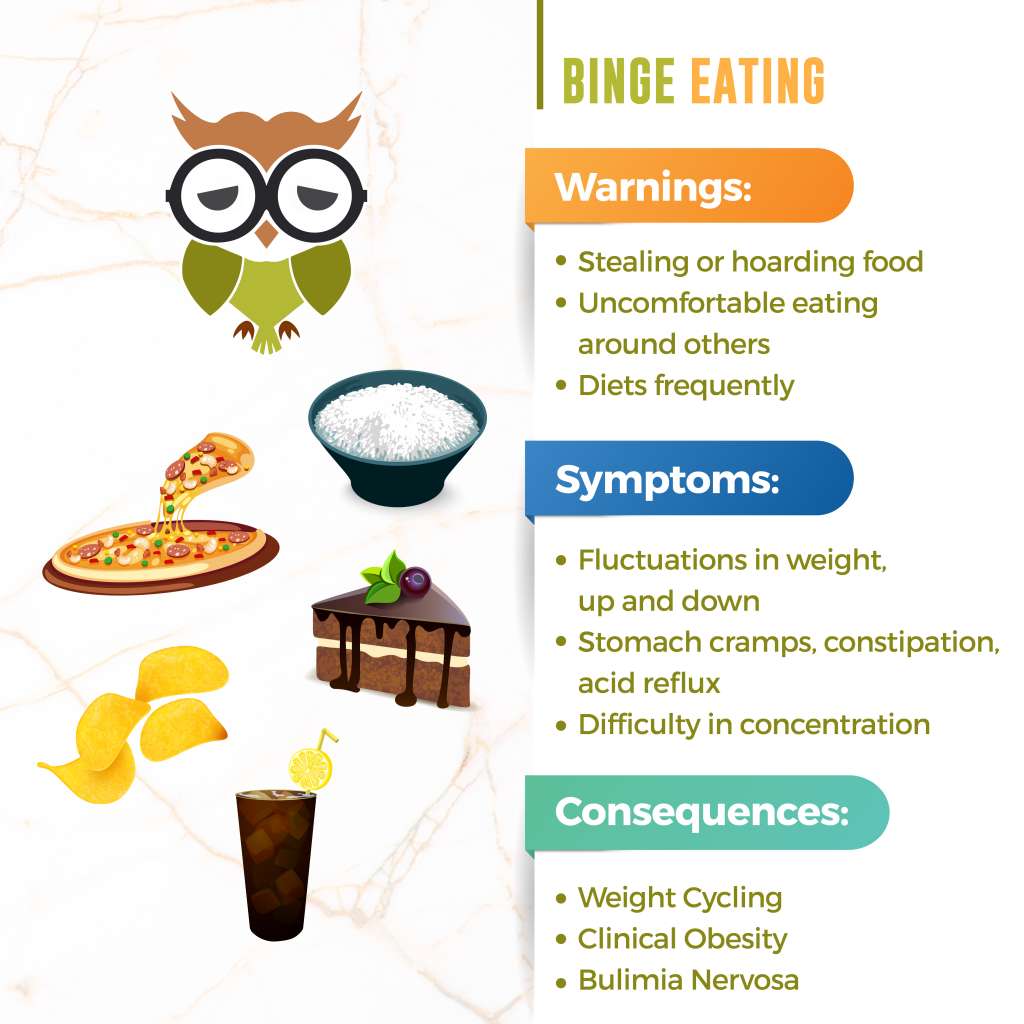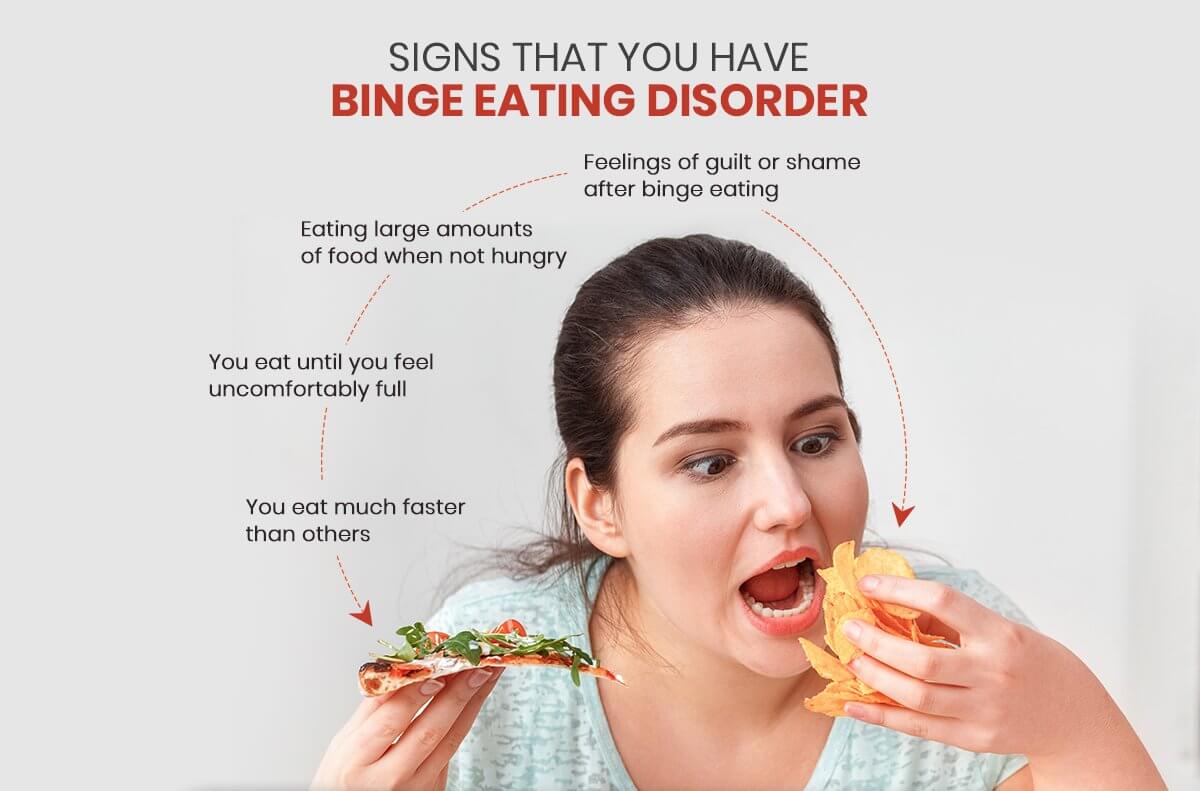WHAT IS BINGE EATING DISORDER?
Binge eating is the most common eating disorder among the U.S. population, especially in the time of the COVID pandemic. Eating disorders can affect people of every age, race, size, gender identity, sexual orientation, and background.
In 1959, Albert Stunkard coined the term Night Eating Syndrome (NES) where people eat uncontrollably at night time. Binge eating is similar to NES, unlike people who cannot stop eating even during the day. The people are unable to control their eating as they lose control. Compulsive eating can get triggered by unknown reasons. Once they are out of the compulsive eating phase they face major guilt issues. This guilt again triggers the abnormal eating behavior turning into a vicious cycle.
Almost 9% of the U.S. population, or 28.8 million Americans, often struggle with some eating disorder in their lifetime. It has been observed that genetic heritability also leads to binge eating disorders, almost 28-74%. Binge eating disorder is among the deadliest mental illnesses even leading to an attempt of suicide, after an opioid overdose.
Binge eating disorder (BED) is a result of a frequent bout of overeating experienced by an individual. Binge eating does not indicate an occasional episode of eating such as eating extra food on a holiday. This does not indicate that you have this illness. During episodes of overeating, the individual consumes large amounts of food and is unable to stop. An individual suffering from a binge eating disorder will overeat regularly.

WHAT CAUSES BINGE EATING DISORDER?
A lot of people find comfort in food. Sometimes, you might eat much more as compared to normal people. But, someone suffering from a binge eating disorder has a very different relationship with food. They experience a loss of all control over the amount of food they eat. They are unable to stop, even when uncomfortably full. They often binge at least once a week for several months.
The exact reason that triggers binge eating in people is unknown to healthcare workers. It has been observed that binge eating is triggered due to a combination of things, including genetics, family eating habits, emotions, and eating behavior, like skipping meals. Food is often experienced as a way to soothe oneself or to cope with difficult feelings.
Some factors that are known to affect people are:
- Psychological: People facing depression, low-esteem, anxiety, stress, etc. As the feelings of the person are heightened negatively may trigger binge eating. Stressful events of life, like abuse, death, separation from a family member, or an accident, are risk factors. Children bullied due to weight may also contribute to binge eating.
- Biological: Hormonal abnormalities may cause uncontrolled eating in people which causes obesity or over-weight issues.
- Traumatic situations: People experiencing major life trauma like sudden loss of loved ones, physical or mental abuse, and body shaming might lead to compulsive eating. Eating helps them to find comfort from the trauma they are going through for some time.
- Genetics: People suffering from binge eating disorders may have increased sensitivity to dopamine. It is a chemical in the brain responsible for feelings of reward and pleasure.
- Gender: Women are more prone to developing binge eating disorders.
People diagnosed with binge eating disorder are likely to be suffering from other mental health problems, such as depression, anxiety, post-traumatic stress disorder (PTSD), and ADHD (attention deficit hyperactivity disorder).
WHAT ARE THE SYMPTOMS OF BINGE EATING DISORDER?
Binge eating leads to obesity or being overweight in people. People usually are unable to stop eating or eat a large amount of food even after they are full, and eating continuously even without break. They may eat normally with people but they hog once they are alone. People feel guilty or disgusted after overeating and this may again lead to compulsive eating. People have complained that they do not feel satisfied or full even after eating a large amount of food.
People often display a combination of symptoms, such as:
- Eating more food regularly in a single sitting.
- Feeling out of control during eating episode.
- Over-eating episodes at least once a week for three months or longer.
- Eating fast.
- Eating past the point of feeling full.
- Negative feelings of shame, guilt, or remorse about binge eating.
- Eating a lot even when not hungry.
- Eating alone, mainly due to embarrassment about a large amount of food.
Binge eating leads to physical, emotional, and social problems in people. Binge eating is not like emotional eating as there is no particular reason for binge eating to be triggered. The severity of binge eating is determined by frequent bouts of bingeing during a week.

HOW CAN BINGE EATING DISORDER BE TREATED?
Healthcare professionals first need to understand what triggers the binge eating episode and how frequently the binge eating episode arises. This decides the course of treatment for the patient. Healthcare professionals may advise cognitive behavioral therapy, interpersonal psychotherapy, dialectical behavior therapy, weight loss therapy, and medication. Some tips that might help people in the early stage are:
- Developing healthier eating habits.
- Avoiding temptations in case the episode triggers.
- No starving which helps in avoiding overeating.
- Mindful eating.
- Focusing on hunger rather than emotional hunger.
It is important to identify the negative feelings and behaviours which cause the episode of binge eating. This may also help in devising the strategy for curing the problem.
Treatment of eating disorder targets binge eating behaviours, excess weight, body image, mental health issues, or a combination of these. The treatment regime includes:
- Cognitive Behavioural Therapy: This therapy focuses on analysing the relationship between negative thoughts, feelings, and behaviours related to eating, body shape, and weight. The therapy focuses on identifying the negative feelings and behaviours causing binge eating and helps put strategies in place to improve them. The strategy is developed on basis of the negative emotions and patterns identified. Specific treatment regime include setting goals, self-monitoring, achieving regular meal patterns, changing thoughts about self and weight, and encouraging healthy weight-control habits. Cognitive therapy is the most effective treatment for binge eating disorder. It may be done with the help of a therapist or with self-help.
- Interpersonal Psychotherapy: This therapy is based on the idea that binge eating is a coping mechanism for unresolved personal problems including grief, relationship conflicts, significant life changes, or underlying social problems. This is a short-term, focused treatment for depression triggering the eating disorder. It provides long-term positive outcome on binge eating disorder.
- Medication: Several medicines such as antidepressants, antiepileptic drugs, and drugs for hyperactive disorders, help in relieving symptoms of binge eating disorder. Medication help reduce appetite, obsessions, compulsions, and symptoms of depression. Some of the drugs might have side-effects such as headaches, stomach problems, sleep disturbances, increased blood pressure, and anxiety.
- Weight Loss Therapy: This therapy aims to help lose weight that may eventually reduce binge eating behaviour by boosting self-esteem and body image. The focus is to adopt healthy lifestyle changes regarding diet, exercise, thought of food and food intake.
TAKEAWAY
Binge eating disorder common eating disorder amount U.S. population. If not treated on time it can seriously affect a person’s health. Binge eating often has negative effects on overall health, body weight, self-esteem, and mental health. Medicines provide short-term relief from binge eating disorder. For long-term relief behavioural therapies are most effective.
If you or anyone you know is suffering from weight-related issues , our expert providers at Zenith Injury Relief & Wellness Clinic will take care of your health and help you recover.
Call us on 972-210-0033 to book an appointment with our specialists, and begin living your life pain-free.
